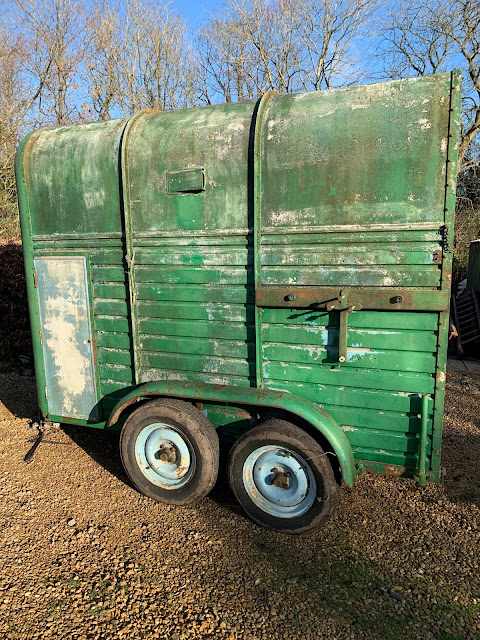I'm really pleased with the progress being made by my bees this year. Having started the year with no bees I now have two thriving colonies, one nucleus of Carniolian bees which I bought, and the other a swarm which came in of its own accord. The swarm is doing extremley well, and has filled up a box and a half with eggs and brood, and almost a full super with honey. I forgot to put the queen excluder on and they seem to be doing so well that I thought I would just let them get on, and they have kept the brood to the bottom and the honey stores in the top super, so all is well. They also seem to be very good tempered bees and I almost feel I could handle them without gloves and bee suit. The carniolian bees are making plenty of brood but have not yet filled up the brood box although their wax is a beautiful pure white.
I have been doing quite a bit of research about bees recently, and have come to the conclusion that I will change my way of keeping bees quite radically in view of what I have learned. Most people are aware of the concern about the welfare of bees worldwide, and many suspects including pests, disease, global warming, poor husbandry, and pesticide use have been suggested. I think it quite likely that most of these are contributory factors and that bees are indeed the "canaries in the coalmine" early warning to us all about the dangers of not caring for our environment. It was interesting to me that when this problem first appeared in the press and on the news some time ago, it was suggested that the difficulties were largely caused by "bad beekeepeers", messing about in their back gardens and not doing a proper job. There were "inefficient amateur beekeepers" allowing the varroa mite to run riot in the population. This reminded me of the way that amateur poultry keepers were set up to be the scapegoats for last years H5N1 or bird flu, before the danger turned out in fact to be closer to intensive factory farms like Bernard Matthews. And then of course this year's great profit making scam for Roche and Glaxo Smith Kline, H1N1 or Swine flu and so on and so on... Sorry, I'm digressing into Rant Mode... Amateur poultry keepers, beekeepers, and gardeners are not the culprits in these scenarios but more often the last bastions of common sense, traditional and local knowledge and practice, many of whom make a substantial contribution to the future of healthy food production and protection of the environment. OK rant over, but to get back to bees - there are similarities between keeping poultry and bees, and it's not just that they both have wings.
Picture from the Barefoot Beekeeper by Phil Chandler showing the author and one of his home made Top Bar Beehives
Before the Reverend Langstroth invented the modern wooden framed beehive so familiar to us all, bees were kept in basketwork skeps where they were free to make whatever kind of honeycomb they wanted. But in return for the wooden framed hive we now give them we have taken away their freedom to live in the way they have chosen to live for thousands of years, and it seems to me that if we keep them like chickens are kept in battery farms, it will all be for the worse. We put them in homes not of their own devizing, try to control and alter their natural behaviors to suit ourselves, transport them around the countryside to pollinate various different crops, sprayed with chemicals, robbed of their precious honey for which we substitute refined white sugar. It's no wonder bees are suffering, it would be amazing if they were not with this kind of treatment. We now largely accept that keeping chickens in tiny cages gives us an inferior product, causes harm to the environment, is less healthy to eat, and is immoral. It's pretty much the same for bees. If we think bees are "just insects", and consider them in welfare terms, we must at least consider the consequences to the wider environment of their being abused.
I've been keeping bees for a few years now and it has always seemed somehow not quite right to me in some way. Now I know why. I now find it appears to be entirely possible to keep bees in a much more natural and "non interventionist" way, by using simple Top Bar Hives and giving up the slightly obsessive control freak style of the modern hive. I'm definately going to give it a try and anyone who is interested in finding out more about these issues should take a look at the Barefoot Beekeeper by Phil Chandler, and the associated web site for natural beekeeping at
http://www.biobees.com/ And if you are interested in keeping bees in a simple, natural, and (not the least important consideration these days) inexpensive way, have a look at Phil's book. He describes how you can start beekeeping without any of the expensive equipment you may have thought you needed and how to make what you do need yourself, if you're even a tiny bit handy or have access to someone who is, neither of which applies to me, unfortunately.
And as a final sad footnote, it even seems that the very people who have been entrusted with looking to the welfare of bees, the BBKA The British Beekeepers Association, are in league with chemical companies like Bayer who produce agricultural chemicals and pesticides of proven danger to bees!! See
http://vimeo.com/1158245 I have written to the BBKA and will not be renewing my membership.











